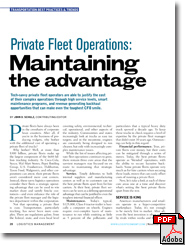Private fleets have always been in the crosshairs of corporate bean counters. After all, if you’re in the business of producing widgets, why bother with the additional cost of operating a private fleet of trucks?
Why bother? Well, at more than $300 billion, private fleets make up the largest component of the $680 billion trucking industry. As Coca-Cola, Sysco, Wal-Mart Stores, Pepsi Bottling Group, U.S. Foodservice, Haliburton, Tyson Food, Walgreen’s, and other corporations can attest, their private fleets aren’t considered mere cost centers. Instead, these savvy logistics operations consider their fleets a strategic operating advantage that can be used to win market share and satisfy finicky customers— and even enhance the role of the private fleet manager and the logistics department within the corporation.
Not that operating a private fleet is easy. Transportation, particularly trucking, has never been more complex. There are regulations galore, from the federal, state, and even local level covering safety, environmental, technical, operational, and other aspects of the industry. Communities and states increasingly look at trucks as easy tax targets; and in the meantime, engines are constantly being designed to run cleaner, but only with increasingly complex maintenance issues.
Click below for related articles
Armstrong brings transportation back in house
Shippers bracing for future rate hikes
ACT says September Class 8 orders up 37 percent
Article topics
Email Sign Up
















